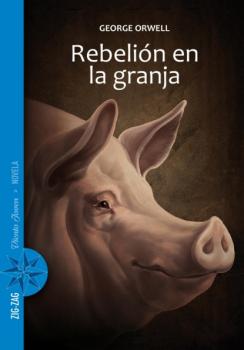George Orwell
Список книг автора George OrwellFarm der Tiere. Eine Märchenerzählung
In seiner düsteren Fabel von 1945 verarbeitet George Orwell die Ereignisse nach der Russischen Revolution und den Stalinismus. Erzählt wird darin, wie die Tiere einer Farm sich zusammentun, um die menschliche Herrschaft abzuschütteln und fortan brüderlich in Freiheit zu leben. Doch bald entstehen Konflikte und Rivalitäten. Es erweist sich, dass auch in einer Gesellschaft der Gleichen «manche gleicher sind als andere». Eine politische Parabel und eines der großen Werke des 20. Jahrhunderts – neu übersetzt und mit einer kompakten Biographie des Autors.
The Essential Works of George Orwell
Musaicum Books presents the George Orwell Collection -the greatest novels, poems, essays and autobiographical works of this great visionary in one volume: Novels: Burmese Days A Clergyman's Daughter Keep the Aspidistra Flying Coming Up for Air Animal Farm 1984 Poetry: Awake! Young Men of England Kitchener Our Hearts Are Married, But We Are Too Young The Pagan Poem from Burma The Lesser Evil Romance Summer-like for an Instant The Italian Soldier Shook My Hand… Reflections on War and Society: Spilling the Spanish Beans Not Counting Niggers Prophecies of Fascism Wells, Hitler and the World State Looking Back on the Spanish War Who Are the War Criminals? Future of a Ruined Germany Revenge is Sour You and the Atomic Bomb Notes on Nationalism Catastrophic Gradualism Freedom of the Park How the Poor Die In Front of Your Nose Thoughts on England: Democracy in the British Army The Lion and the Unicorn Antisemitism in Britain In Defence of English Cooking Decline of the English Murder Politics and the English Language Views on Literature, Art & Famous Men: In Defence of the Novel Notes on the Way Charles Dickens Literature and Totalitarianism The Art of Donald Mcgill Rudyard Kipling W. B. Yeats Mark Twain—the Licensed Jester Lear, Tolstoy and the Fool Writers and Leviathan Reflections on Gandhi… Book Reviews: Mein Kampf The Totalitarian Enemy… Miscellaneous Writings: A Farthing Newspaper The Spike Boys' Weeklies and Frank Richards's Reply Poetry and the Microphone The Sporting Spirit… Autobiographical Works: A Hanging Down and Out in Paris and London Bookshop Memories Shooting an Elephant The Road to Wigan Pier Homage to Catalonia Marrakech Why I Write…
Animal Farm (Musaicum Must Classics)
Animal Farm is an allegorical novel which reflects events leading up to the Russian Revolution of 1917 and then on into the Stalinist era of the Soviet Union. Old Major, the old boar on the Manor Farm, summons the animals on the farm together for a meeting, during which he refers to humans as «enemies» and teaches the animals a revolutionary song called «Beasts of England». When Major dies, two young pigs, Snowball and Napoleon, assume command and consider it a duty to prepare for the Rebellion. The animals revolt, driving the drunken, irresponsible farmer Mr Jones, as well as Mrs Jones and the other human caretakers and employees, off the farm, renaming it «Animal Farm». They adopt the Seven Commandments of Animalism, the most important of which is, «All animals are equal».
1984
Contrario al imperialismo británico, las guerras que sacudieron el mundo en la primera mitad del siglo XX y el auge de las corrientes totalitarias en el continente europeo, en esta distopia inspirada en los regímenes fascistas y el el comunismo soviético, Orwell vaticinó con casi 40 años de antelación un futuro tétrico, regido por un Estado absoluto en el que las personas han perdido su individualidad y su derecho a la intimidad, y la sociedad ya carece de la más mínima capacidad para gobernarse a sí misma.
Última y más perdurable obra de George Orwell, por su magnífico análisis de los mecanismos internos del poder y de las relaciones y dependencias que crea en las personas, 1984 es una de las novelas más inquietantes y atractivas del siglo XX.
Rebelión en la granja
Los animales de la granja deciden terminar con el dominio de los seres humanos y se toman el poder. En la nueva sociedad, todos los animales serán iguales. Pero a medida que pasa el tiempo, van apareciendo caudillos, un líder, grupos excluidos… Y bajo el mandato de las nuevas autoridades, la mayoría va perdiendo poco a poco sus derechos y la libertad.
The Complete Works
e-artnow presents the George Orwell Collection, compiled of the greatest novels, poems, essays and autobiographical works of this great visionary: Novels: Burmese Days A Clergyman's Daughter Keep the Aspidistra Flying Coming Up for Air Animal Farm 1984 Poetry: Awake! Young Men of England Kitchener Our Hearts Are Married, But We Are Too Young The Pagan Poem from Burma The Lesser Evil Romance Summer-like for an Instant The Italian Soldier Shook My Hand… Reflections on War and Society: Spilling the Spanish Beans Not Counting Niggers Prophecies of Fascism Wells, Hitler and the World State Looking Back on the Spanish War Who Are the War Criminals? Future of a Ruined Germany Revenge is Sour You and the Atomic Bomb Notes on Nationalism Catastrophic Gradualism Freedom of the Park How the Poor Die In Front of Your Nose Thoughts on England: Democracy in the British Army The Lion and the Unicorn Antisemitism in Britain In Defence of English Cooking Decline of the English Murder Politics and the English Language Views on Literature, Art & Famous Men: In Defence of the Novel Notes on the Way Charles Dickens Literature and Totalitarianism The Art of Donald Mcgill Rudyard Kipling W. B. Yeats Mark Twain—the Licensed Jester Lear, Tolstoy and the Fool Writers and Leviathan Reflections on Gandhi… Book Reviews: Mein Kampf The Totalitarian Enemy… Miscellaneous Writings: A Farthing Newspaper The Spike Boys' Weeklies and Frank Richards's Reply Poetry and the Microphone The Sporting Spirit… Autobiographical Works: A Hanging Down and Out in Paris and London Bookshop Memories Shooting an Elephant The Road to Wigan Pier Homage to Catalonia Marrakech Why I Write…
Homage to Catalonia
Homage to Catalonia is George Orwell's personal account of his experiences and observations fighting for the POUM militia of the Republican army during the Spanish Civil War. The war was one of the defining events of his political outlook and a significant part of what led him to write in 1946, «Every line of serious work that I have written since 1936 has been written, directly or indirectly, against totalitarianism and for Democratic Socialism, as I understand it.»
The first edition was published in the United Kingdom in 1938. The book was not published in the United States until February 1952, when it appeared with an influential preface by Lionel Trilling. The only translation published in Orwell's lifetime was into Italian, in December 1948. A French translation by Yvonne Davet—with whom Orwell corresponded, commenting on her translation and providing explanatory notes—in 1938–39, was not published until five years after Orwell's death.
1984
It is a dystopian social science fiction novel by English novelist George Orwell. It was published on 8 June 1949 by Secker & Warburg as Orwell's ninth and final book completed in his lifetime. Thematically, Nineteen Eighty-Four centres on the consequences of totalitarianism, mass surveillance, and repressive regimentation of persons and behaviours within society. Orwell, himself a democratic socialist, modelled the authoritarian government in the novel after Stalinist Russia. More broadly, the novel examines the role of truth and facts within politics and the ways in which they are manipulated.
The story takes place in an imagined future, the year 1984, when much of the world has fallen victim to perpetual war, omnipresent government surveillance, historical negationism, and propaganda. Great Britain, known as Airstrip One, has become a province of a totalitarian superstate named Oceania that is ruled by the Party who employ the Thought Police to persecute individuality and independent thinking.[5] Big Brother, the leader of the Party, enjoys an intense cult of personality despite the fact that he may not even exist. The protagonist, Winston Smith, is a diligent and skillful rank-and-file worker and Outer Party member who secretly hates the Party and dreams of rebellion. He enters into a forbidden relationship with a colleague, Julia, and starts to remember what life was like before the Party came to power.









